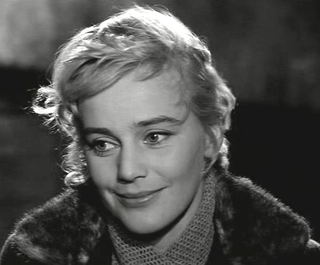
Maria Margarethe Anna Schell was an Austrian-Swiss actress. She was one of the leading stars of German cinema in the 1950s and 1960s. In 1954, she was awarded the Cannes Best Actress Award for her performance in Helmut Käutner's war drama The Last Bridge, and in 1956, she won the Volpi Cup for Best Actress at the Venice Film Festival for Gervaise.

Paula Anna Maria Wessely was an Austrian theatre and film actress. Die Wessely, as she was affectionately called by her admirers and fans, was Austria's foremost popular postwar actress.

Attila Hörbiger was an Austrian stage and movie actor.
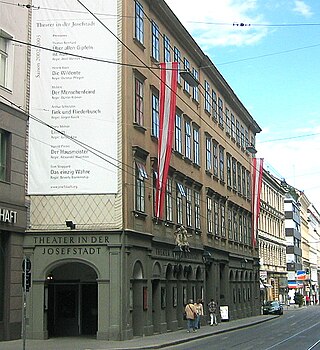
The Theater in der Josefstadt is a theater in Vienna in the eighth district of Josefstadt. It was founded in 1788 and is the oldest still performing theater in Vienna. It is often referred to colloquially as simply Die Josefstadt.
Wien-Film GmbH was a large Austrian film company, which in 1938 succeeded the Tobis-Sascha-Filmindustrie AG and lasted until 1985. Until 1945 the business was owned by the Cautio Trust Company, a subsidiary of the German Reichsfilmkammer, and was responsible for almost the entire production of films in the territory of the Ostmark, as Austria was called at that time.

The Gottbegnadeten-Liste was a 36-page list of artists considered crucial to National Socialist culture. The list was assembled in September 1944 by Joseph Goebbels, the head of the Ministry of Public Enlightenment and Propaganda, and Germany's supreme leader Adolf Hitler.

Paul Hörbiger was an Austrian theatre and film actor.

The Angel with the Trumpet is a 1950 British drama film directed by Anthony Bushell and starring Eileen Herlie, Basil Sydney, and Norman Wooland. It was based on a novel by Ernst Lothar. The film follows the rise and fall of an Austrian aristocrat, and her eventual death following the Anschluss. The film was a remake of a 1948 Austrian film Der Engel mit der Posaune.

Helene Ottilie Thimig was an Austrian stage and film actress.

Maria Ilona is a 1939 German historical drama film directed by Géza von Bolváry and starring Paula Wessely, Willy Birgel, and Paul Hörbiger. The film is set in Austria during the reign of Ferdinand I. It is an adaptation of Oswald Richter-Tersik's novel Ilona Beck.
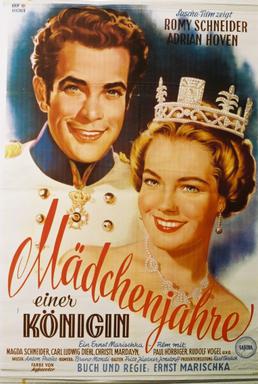
Victoria in Dover is a 1954 Austrian historical romantic comedy film directed by Ernst Marischka and starring Romy Schneider, Adrian Hoven and Magda Schneider. It is a remake of the 1936 Erich Engel film Victoria in Dover, which was based on a 1932 play by Sil-Vara. Romy Schneider's performance as a spirited young royal was a lead-in to her best known role in Sissi and its sequels, although Marischka had originally intended to cast Sonja Ziemann as Victoria.

Cordula is a 1950 Austrian drama film directed by Gustav Ucicky and starring Paula Wessely, Attila Hörbiger and Jane Tilden. It is based on a 1925 poem by Anton Wildgans about a woman in a small town who falls pregnant to a local forester serving in the Austrian Army during the First World War.
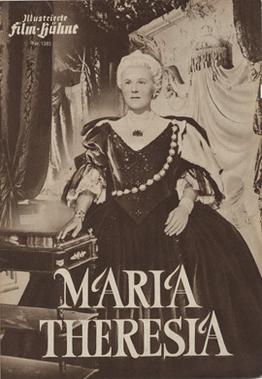
Maria Theresa is a 1951 Austrian historical drama film directed by Emil E. Reinert and starring Paula Wessely, Fred Liewehr and Marianne Schönauer. It portrays the life of the eighteenth century Habsburg Empress Maria Theresa.

Maresi is a 1948 Austrian period drama film directed by Hans Thimig and starring Attila Hörbiger, Maria Schell and Siegfried Breuer. It was one of the box offices successes of 1948.

Walking Back into the Past is a 1954 Austrian drama film directed by Karl Hartl and starring Paula Wessely, Attila Hörbiger and Josef Meinrad.

The Immortal Face is a 1947 Austrian historical drama film directed by Géza von Cziffra and starring Marianne Schönauer, O.W. Fischer and Helene Thimig. The film's sets were designed by the art director Fritz Jüptner-Jonstorff. Géza von Cziffra adapted the screenplay from his own 1943 play of the same title.

Vagabonds is a 1949 Austrian drama film directed by Rolf Hansen and starring Paula Wessely, Attila Hörbiger and Adrienne Gessner. The film's premiere was attended by the President Karl Renner and members of the government. It was shot at Salzburg Studios and on location in the city. The film's sets were designed by the art director Julius von Borsody. It was released in West Germany on 3 March 1950 by Bavaria Film. It is also known by the alternative title Vagabunden der Liebe.
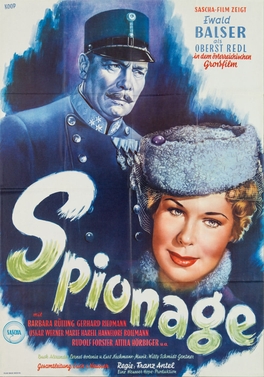
Espionage is a 1955 Austrian historical spy drama film directed by Franz Antel and starring Ewald Balser, Barbara Rütting and Gerhard Riedmann. It was shot at the Sievering Studios and on location in Vienna. The film's sets were designed by the art director Felix Smetana. It was based on the real story of Alfred Redl, an officer serving with Austrian Military Intelligence who was also secretly spying for the hostile Russian Empire before the First World War.

















